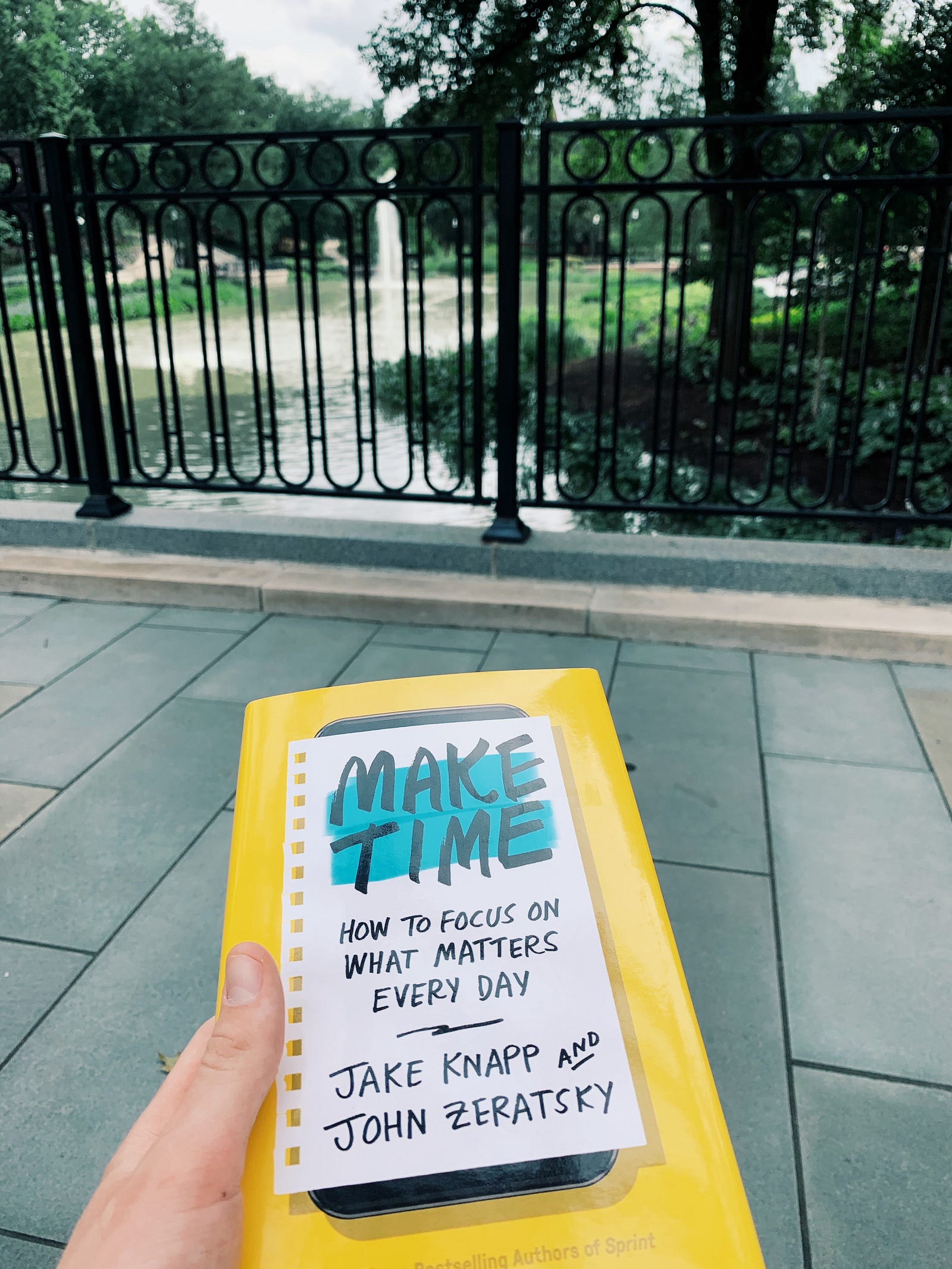If a craftsman wants to do good work, he must first sharpen his tools. — Confucius
In math words, productivity typically is units of output per unit of time. Talking about our own work that way makes us feel like machines, and is a bit too reductionist. When I think of productivity, I think about getting done what I need to get done in time so that I can do what I want to get done. However you define it, productivity matters to you whether you’re a student, knowledge worker, parent, landscaper, or anything in between.
As a freelancer, increasing my productivity has allowed me to increase the amount of money I can make per hour.
As a student, focusing on productivity ensures that I stay on top of my coursework while still enjoying the meaningful things in life, like walks in the woods with my girlfriend.
So, I’ve compiled a list of my favorite productivity tips that I’ve discovered in the last few years, and I hope you find them as helpful as I have. —
Daily Highlight 🔍
This is concept is pretty new to me, and it comes from the book “Make Time” by Jake Knapp and John Zeratsky. They advocate for picking a single priority for the day and putting as much energy as possible into it. As someone who typically makes obsessively detailed lists for my days, this is a little bit odd to me — So of course I tried it out for myself.

In the book (which I cannot recommend enough), the authors explain that todo lists aren’t focused enough, and long term goals are too hard to measure progress towards. Whenever you sit down to do work, whatever that looks like for your occupation, you should write down the one thing that matters most to you for the time you’re about to spend.
I’ve been doing this for about 2 weeks now, and it’s helped me in a few different ways. For one, it keeps me honest and focused on what matters most. I’m far less likely to get sucked into reading documentation when I know my highlight for the day is to “Finish Writing New Tests”. But beyond that, it gives me greater satisfaction as I stop working for the day. Even if I miss some other todo items, it’s remarkably rewarding to set out what I accomplish to do.
I definitely recommend setting a highlight at the beginning of your work/school times. If the concept interests you more, then you’d enjoy the book! They don’t give me anything for saying that 🤷♂️
Deep Work 🤫
Cal Newport (there’s that name again 🤷♂️) says ‘Deep work’ is the ability to focus without distraction on a cognitively demanding task. Focusing in a modern world is an uphill battle. He has a lot of things to say on the subject, so much so that he wrote a whole book about it. In the aptly titled “Deep Work” he argues that our constantly distracting digital tools stop us from getting meaningful work done in normal quantities.
Essentially, the idea is that you do your best work when you’re completely focused on one thing for an extended period of time. If you say, need to write a 5 page paper, that’s deep work. Checking your email however, is “shallow work.” In the past, I’ve broken down tasks like writing a 5 page paper into small intervals to make it manageable, but this often leads to lost time and a lower quality product, as your brain is spending too much time going in and out of the deep work “zone.”
The best way to approach something with deep work, is to schedule some time for it, a process called “time blocking,” and then focus on that thing, eliminating distractions like notifications or meetings.
There’s a pretty cool startup called Clockwise that produces a tool that will automatically rearrange your meetings (and subsequently, your colleague’s calendars) to allow you as large of a contiguous block of free time as possible to get deep work done.
Here’s my favorite blog post that explains more on deep work
Deep Work: The Complete Guide (Including a Step-by-Step Checklist)
Pomodoro ⏰
Pomodoro is my go-to strategy for getting myself moving when I really don’t want to. Inertia extends beyond a force of nature and into our professional lives. If we’re already really productive, it tends to be nice and easy to do the next task. If we’ve been slugging around for a while, it can become incredibly hard just to get moving on that first thing. However, once most people get started, they find that getting past that initial friction is all they needed.
Pomodoro relies on the inertia rule of productivity to get things done in short intervals with breaks as a reward system. The idea is you set a work timer, typically for 25 minutes, and focus on one task for the entire period. Then, you take a 5 minute break to be a sloth again and repeat as needed.
Work for 25 minutes, take a five minute break. If you do this twice, you will have accomplished 50 minutes of high quality work in just 1 hour, which is a win no matter how you look at it. This technique conflicts a bit with the philosophy of deep work given it advocates for short time periods, but it does protect your attention while you work, which is an absolute must. Most importantly, it gets you over that initial friction from getting started. It’s really hard to convince yourself to study for 4 hours, but it’s really easy to convince yourself to study for 25 minutes 🤔
Regular Sleep 😴
Sleep can make you more productive. It always seems like sleep can be a waste of time, right? I mean, to sleep 8 hours a night, we spend 1/3rd of our life unconscious. How can that be productive?
Thinking of sleep that way is a bit too reductionist. While we sleep, our brain does the necessary work to decompress, rest, and shift things from short term to long term storage.
Not to mention the negative effects on your well-being, if you don’t sleep enough, or you sleep inconsistently, you will surely suffer professionally. I’ve found that sleeping 7–8 hours a night, every night, helps me to feel focused and healthy, freeing me to do my best work and enjoy life without having to make too many sacrifices.
Don’t look at sleep as a waste of time, but look at it as the best way to take care of yourself.
Task Management 👨🔬
Entire books have been written about task management, and dozens of applications are out there to help refine it. The single greatest benefit of keeping things you want and need to do in a written or digital system is the bandwidth it frees up in your mind. Whenever a thought pops into my head, something like “Get a mothers day card for mom”, I throw it into my task app and my mind is free to resume doing real work. It seems tiny, but the pressure of trying to remember your responsibilities, no matter how large, can cost you tons of time.
Any approach to keeping your tasks under control is better than no approach, but I tend to go as organized as possible. I prefer apps over paper, so that I can always access it, and it’s easy to move things around. Specifically, I use Todoist, which I’ve written a whole article about. I throw things into the app as they come into my head, and at the beginning of every week I refine things to make sure each day is manageable in workload. I use the priorities feature to single out my highlight, a nod to my newest tip above.
Even if a todo app wouldn’t help you with your job, it will help you with your life. Wouldn’t it be nice to be known as dependable?
Unplug 🔌
This one seems obvious to me. Our minds are constantly stimulated, a condition that we’ve only faced for the last few decades. In his book, “Digital Minimalism,” Cal Newport advocates for a simple life free of constant digital distraction. Now, you don’t have to take all his advice, but a big takeaway is the mental benefit you receive from doing something outside of screens, especially if all your work is done on a screen. This means, after a long day at the computer, watching TV isn’t necessarily the best option for your noggin.
Things like going on a walk, cooking, and investing in meaningful relationships all pay huge dividends on your productivity. We’re not built to work all the time, so if you let your work or low-quality leisure consume your life, you’ll find yourself struggling to compete with (and less happy than) your peers who take time to unplug.
If the thought of unplugging makes you nervous, it’s a good sign your brain needs that break even more.
Reading 📖
Reading gives you superpowers, simple as that. If you make reading a regular habit, your attention span will increase and strengthen, alongside your rapidly growing reading speed. Beyond that, you also absorb information from whatever you happen to be reading.
Plenty of successful people make reading a priority in their life. Warren Buffet is known to spend 5–6 hours a day reading, while Bill Gates is known to pour through 50 books a year. When asked about his reading, Buffet said,
“Read 500 pages like this every day. That’s how knowledge works. It builds up, like compound interest. All of you can do it, but I guarantee not many of you will do it.”
Reading is a wonderfully relaxing and rewarding hobby that will push you towards success faster than any other.

